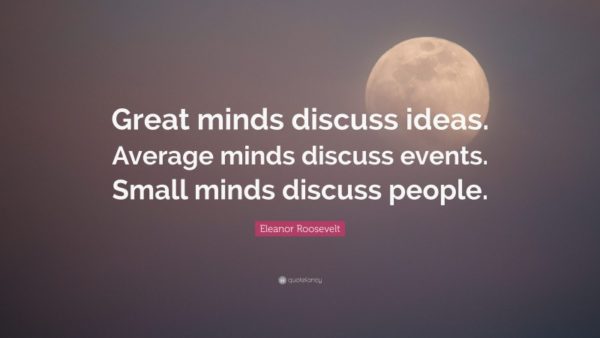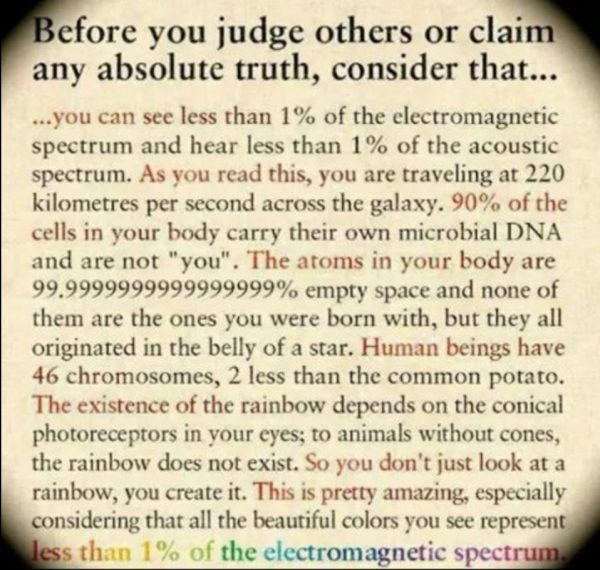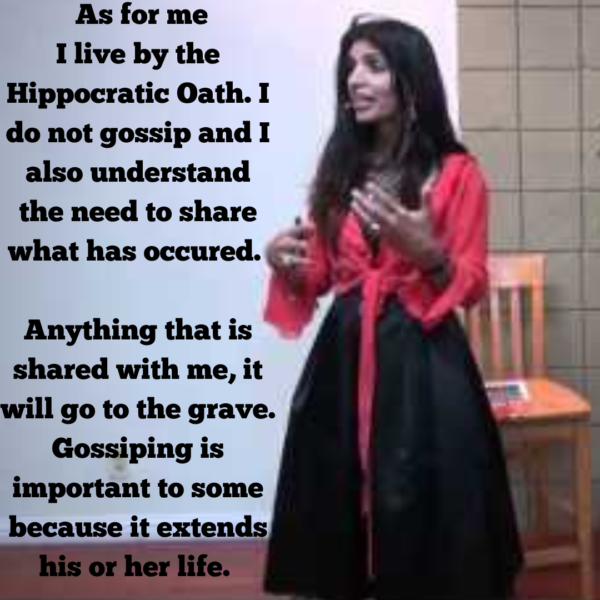
Question: Does Gossiping help or hurt your health?
Answer: Depends – there are different types -and some types drastically hurt you and others physically and emotionally! Some types of gossip are therapeutic!
What did the wise SOCRATES, you know, the great ancient Greek philosopher say about someone speaking to him of another that is not present? (Make sure it is true and beneficial)
A person walks up to Socrates and begins this conversation:
– “Do you know what I just heard about your friend?”
– “One moment” –Socrates answered– “before you tell me, I would like to make you a test of the three sieves.”
– “The three sieves?”
– “Yes”– continued Socrates – “before telling anything about the others, it is good to take the time to filter what you want to say.”
“I call it the three-sieve test. The first sieve is the truth. Have you checked if what you are going to tell me is true?”
– “No, I just heard it.”
– “Very well. So you don’t know if it’s true. We continue with the second sieve, that of goodness. What you want to tell me about my friend, is it a good thing?”
– “Oh no! On the contrary.”
So, Socrates questioned, “you want to tell me bad things about him and you’re not even sure they’re true?”
“Perhaps you can still pass the test of the third sieve of usefulness. Is it useful for me to know what you are going to tell me about this friend?”
– “Nope.”
– “So”– concluded Socrates – “what you were going to tell me is neither true, nor good, nor useful so why did you want to tell me?”
The Truth About Gossip | Oprah’s Lifeclass | Oprah Winfrey Network
For more on #lifeclass,
visit http://bit.ly/1nPCfuF
Find OWN on TV at http://www.oprah.com/FindOWN
“What you need to know is a person who would betray you by {sharing something you asked to keep secret} gossip would betray you any other way if they had the opportunity”
~Oprah
The key take away from the video from Oprah’s Lifeclass with Iyanla is -question the reason someone speaks about another person!
If the reason to speak about another person is to hurt a person
you are betraying yourself as well as every person involved!
Hurt people hurt people!

If someone is spreading hurt energy what must you do?
“Margaret Mead said ‘that a small group of people can change the world but here’s the very cynical way to look at it, I call this Logan’s corollary to this very famous quote which is that ‘never doubt that asmall group of thoughtless uncommitted people can prevent the world from changing.”
People who gossip for Malice or to hurt others because they are hurt – are those uncommitted people.
The fabric of our relationship was ripped!
Dave Logan is a faculty member at the University of Southern California (USC)’s Marshall School of Business, a best-selling author, and management consultant. Having served on the Marshall faculty since 1996, he currently teaches management and leadership in the USC Executive MBA. He is also on the faculty at the Getty Leadership Institute, and the International Centre for Leadership in Finance (ICLIF), endowed by the former prime minister of Malaysia. From 2001-2004, he served as Associate Dean of Executive Education at USC. He co-founded CultureSync, a management consulting firm, in 1997, and currently serves as senior partner. The firm has worked with dozens of Fortune 500 companies on the intersection between organizational culture and performance. Dave is co-author of four books including Tribal Leadership and The Three Laws of Performance. The Three Laws of Performance has been on the best-sellers lists of USA Today, The Wall Street Journal, and Business Week. He has a Ph.D. from the Annenberg School at USC. About TEDx, x = independently organized event In the spirit of ideas worth spreading, TEDx is a program of local, self-organized events that bring people together to share a TED-like experience. At a TEDx event, TEDTalks video and live speakers combine to spark deep discussion and connection in a small group. These local, self-organized events are branded TEDx, where x = independently organized TED event. The TED Conference provides general guidance for the TEDx program, but individual TEDx events are self-organized., (*Subject to certain rules and regulations)
Could you be required to speak about others what used to be considered gossip?
What does the Data say about Gossip?
She writes for TIME and examined
Gossip. All humans partake …it’s inevitable that everyone who talks, well, talks about other people. In fact, a 1993 observational study found that male participants spent 55% of conversation time and female participants spent 67% conversation time on “the discussion of socially relevant topics.”
So, can gossip be good for you and constructive for society?
“People are really resistant to thinking about gossip as anything but a bad behavior,” says Researcher Megan Robbins a psychologist at the University of California, Riverside And Mathew Feinberg notes that there are some types of gossip that should be avoided, such as gossip that is purely harmful and serves no greater purpose — like mean comments about someone’s looks.
In such a scenario, “you’re not learning anything,” Robbins adds. “No one is benefiting.”
There’s also a physiological distinction to be drawn between active and passive participation in gossip. Matthew Feinberg, an assistant professor of organizational behavior at the University of Toronto’s Rotman School of Management, and his colleagues explored this in a 2012 study published in the Journal of Personality and Social Psychology. When subjects heard about another person’s anti-social behavior or an injustice, their heart rates increased. When they were able to actively gossip about the person, or the situation, on the other hand, it soothed them and brought their heart rates down. The act of gossiping, Feinberg explains, “helps calm the body.”
From: ~https://time.com/5680457/why-do-people-gossip/
Socrates & Oprah are stopping Betrayal and Lies
Betrayal is not keeping a promise & telling lies!
Before you share info
make sure it is not betrayal or a lie you are about to listen to:
Please
have it pass the “The three sieves” Test.
Here is the test to see if it is a rumor vs gossip:
Ask yourself these questions:
~”Have you checked if what you are going to tell is true?”
~”What you want to tell, is it a good thing?”
~Is it useful to know what you are going to tell?”
You tell because
you can apply what you have learned In your world.
You tell another so they may learn from you!
And most of all
You Need more Discernment tools?
Discernment -your ability to judge well comes with courage!
You must become a courageous person and share your direct experiences.
Most important is sharing about a person that bares false witness about another!

Would you be willing to feel responsible for every word you say, hear, or omit?
COURAGE. It takes courage to stand up for yourself, another, and the truth! It takes courage to find the right person to help you with all that could be considered gossip.
You will help all of life to have help -evaluate what has happened with a wise friend, coach or therapist!
~Is it useful to know what you are going to tell?”
If the answer is yes then
our Earth, our human family requires you to live in it with courage.
You have to always push your comfort zone
Every day push yourself.
For your mental wellness and for social impact -share, gossip, and truly be you with the right advisor.
When you are hearing from another, if what is shared is hurtful or mean in nature then, keep it to yourself!
If doesn’t benefit another or create more authentic trust -then keep what you have heard to yourself.
Have a generous heart towards every hurt person!
Do what is beyond your comfort zone.
To create the next best version of life for all concerned
The option to gossip may save a great deal of people a lot of pain if you normally do not.
If you gossip all of the time -the option to “fast” from it -is ideal.
Whistleblowers are needed! Do speak to mentors, wise ones, and the right person to help you decipher if gossiping is important for you!



Leave a Reply